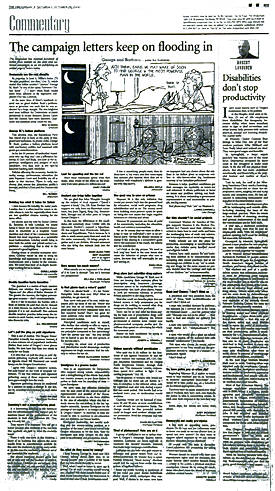By Robert Landauer
I spot more heroes now in Oregon businesses than in its politics. At the Shopko retail store in Salem, 23 out of 105 employees have disabilities. But incapacity becomes ability when team members learn to sign to deaf co-workers and when bosses help persons with various physical, mental and learning disabilities master tasks.
At Winners Choice Custom Bow Strings in John Day, two of the four workers partners Mike Slinkard and Tom Nealy hired and trained are deaf. They earn good wages and benefits.
In Springfield, a heart attack knocked this woman out of the work force. Depression mounted for three years as she struggled to make ends meet. At 66, she still has physical limitations. But she has been revitalized emotionally and financially as the popular hostess and cashier at Rose's Diner.
Task by task, the staff at the Newberg Veterinary Clinic teach a learning-disabled 23-year-old to clean the examination room, surgery,lab, and x-ray rooms and reception area. He has advanced to restocking instruments and supplies in the examination room.
Next in his career-development plan will be landscaping and outside skills, including cleaning the barn of the large-animal practice. Then he wants to learn details of cleaning, stocking and general maintenance of the truck the veterinarians use for field visits.
A year ago, a sheltered workshop told this young man that he had no employable skills. With his employers' patient training, he'll soon be working full time with full benefits.
Courtyard by Marriott, Springfield, created a new position for two employees with emotional difficulties who needed to work together for support.
At St. Vincent dePaul Rehabilitation Services in Portland, 52 people assemble more than 50 parts for Freightliner, North America's largest builder of medium- and heavy-duty diesel trucks.
The workers are part of a profit-driven system that minimizes inventory costs by delivering parts ranging from cigarette lighters to bed frames to the truck-maker just in time for use on the production line. Some of the workers are in recovery from alcohol and drug abuse. Others work only when not too worn down by chemotherapy or radiation treatments. many are former residents of the recently closed Fairview Training Center, the state institution for the mentally retarded.
Persons with mental illnesses, vision or hearing losses and other physical impairments -- even those with profound disabilities -- find this one of the surest, safest and most flexible ways to rejoin the world of productive work.
They are paid market rates based on their productivity, which is monitored by the U.S. Department of Labor. The United States has its lowest jobless rate in 30 years. Employers are stretched to find workers to carry out vital operations. Yet 7.8 million Americans with disabilities who want to work, about 70 percent of working-age people with disabilities, are jobless. In the past huge barriers blocked their road to work. Training often was supplied only by employers. Companies feared that workplace accommodations would be intolerably expensive and burdensome. And people with disabilities who took jobs risked losing vital medical and other benefits.
Most of that is ancient history. The average workplace accommodation cost is $200. When it is higher, public agencies and nonprofit operations pitch in.
In Oregon, IAMCARES (the International Association of Machinists Center for Administering Rehabilitation and Employment Services) has placed 600 persons with disabilities in jobs. It has acquired and installed computers with Braille keyboards for blind workers and voice-actuated computers for those with other disabilities.
Also, Oregon's Employment Initiative that began in 1996 and the federal government's Ticket to Work and Work Incentive Improvement Act of 1999 let persons with disabilities get job-related training from a provider to their choice and essentially insulate them against loss of medical benefits.
Alibis for leaving persons with disabilities on the sidelines are disappearing. Businesspeople who see that are gutty, good-hearted and smart.
© 2000, Oregonian Publishing Co. All rights reserved. Used with permission of The Oregonian.

Please sign up below for important news about the work of The Carter Center and special event invitations.